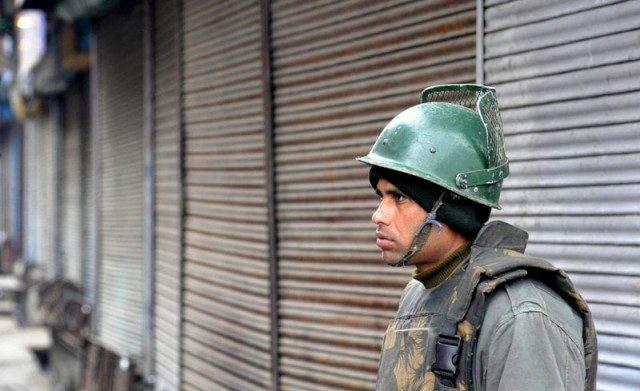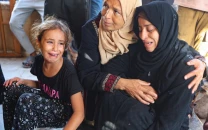Strike paralyses Indian Kashmir as curfew lifted
Much of Kashmir remained under tight security with thousands of police and paramilitary forces deployed in riot gear.

An Indian paramilitary soldier stands guard during a strike in Srinagar on February 16, 2013. PHOTO: AFP
Authorities declared the curfew in the region last weekend, shut down mobile Internet services and blocked newspapers to contain unrest over the execution of Mohammed Afzal Guru.
But as the curfew was lifted, groups opposed to Indian rule in the Muslim-majority region announced a two-day general strike that closed businesses, schools and banks and kept public transport off roads.
"The curfew has been lifted from all the areas and whatever restrictions you may see now are because of the shutdown," said Shiv Murari Sahai, a senior police official, told AFP in Kashmir's main city Srinagar.
Much of Kashmir remained under tight security with thousands of police and paramilitary forces deployed in riot gear.
Three people died during the week as demonstrators defied the curfew, including a teenaged boy shot by Indian security forces.
Guru was convicted of conspiring with militants who raided parliament in 2001 and brought India and Pakistan to the brink of war.
Politicians say the execution could feed anti-India feeling and fuel more violence in Kashmir, where a separatist conflict has claimed an estimated 100,000 lives over the last 20 years.
The one-time fruit merchant and medical college dropout had insisted he was innocent and that he was denied a proper legal defence. Protesters have accused police of framing him.
Guru's execution was mired in further controversy after his family said they learned about his death from television.
His family has rejected an offer by Indian authorities to pray at his graveside inside the prison where he was executed, insisting his body be buried in Kashmir.
A grave with headstone has been readied for Guru in the so-called "Martyrs' Graveyard" in Srinagar with an inscription reading: "His mortal remains are lying in trust with the government of India. The Kashmiri nation awaits its return."



















COMMENTS
Comments are moderated and generally will be posted if they are on-topic and not abusive.
For more information, please see our Comments FAQ